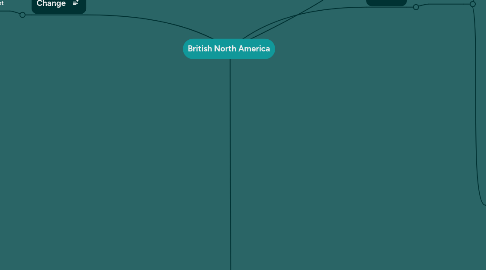
1. Change
1.1. Major changes to Government
1.1.1. politicians suggestions
1.1.1.1. no appointed officals
1.1.1.2. voters should choose all government representatives
1.1.1.3. recommended that lieutenant-governor, excutive council and legislative council should be removed
1.1.1.3.1. These positions would be replaced by elected ones
1.1.1.4. Advices ignored
1.1.1.4.1. Because system would be too American
1.1.2. Politicans
1.1.2.1. Robert Baldwin
1.1.2.1.1. Politican in Upper Canada
1.1.2.2. Louis-Hippolyte LaFontaine
1.1.2.2.1. Politician in Lower Canada
1.1.2.3. Both believed minor changes would be good enough
1.1.2.4. Both argued that the Canadas should have responsible government
1.1.2.4.1. If there was responsible government...
2. Map
3. Conflict
3.1. Rebellions
3.1.1. Rebellion of 1837 in Upper Canada
3.1.1.1. Mackenzie
3.1.1.1.1. Feld to the United States
3.1.1.1.2. leader of the rebellion
3.1.1.2. December 1837
3.1.1.2.1. Supporters gathered at Montgomery's Tavern
3.1.1.2.2. Attack
3.1.1.3. Supporters
3.1.1.3.1. Mostly consisted of...
3.1.1.3.2. Weapons carried
3.1.2. Rebellion of 1837 in Lower Canada
3.1.2.1. Battle of Saint-Denis
3.1.2.1.1. Rebellion began in November 1837
3.1.2.2. Battle of Saint-Charles
3.1.2.2.1. Rebellion began in November 1837, two days after Saint-Denis
3.1.2.3. Battle of Saint-Eustache
3.1.2.3.1. Rebellion began on December 1837
3.1.2.3.2. Patriote Camp
4. Important People
4.1. Sir Francis Bond Head (1793 - 1875)
4.1.1. Appointed Lieutenant-Govenor of Upper Canada In 1835, represented crown
4.1.2. Appointed reformers to the executive council
4.1.2.1. supported them to make the government more democratic
4.1.3. Appointed members to the executive council
4.1.4. Supported executive council to make the government more democratic
4.1.5. Interfered with elections
4.2. Louis-Joseph Papineau (1786-1871)
4.2.1. Supported reform
4.2.2. Made a list called the "Ninety-Two Resolutions"
4.2.2.1. About the demands the reform wanted
4.2.3. Supporters were called the Patriotes
4.2.4. Wanted to achieve reform through a peaceful means, others wanted to rebel
4.2.5. Supported a rebellion in 1837
4.2.5.1. Fled to the US when rebellion failed
4.2.6. Returned in 1846
4.2.6.1. When government granted an amnesty
4.2.6.1.1. Amnesty: pardon or forgiveness, granted to people for political offences such as rebellions
4.3. William Lyon Mackenzie (1795-1861)
4.3.1. Elected to the legislative assembly in 1828
4.3.1.1. strong supporter of reform
4.3.2. Expelled in 1831 for false and damaging reports about someone
4.3.3. Insulted enemies
4.3.4. Re-elected to the assembly four times
4.3.4.1. was not able to take his seat due to the false reports of people
4.3.5. started a rebellion in Upper Canada
4.4. Lord Durham
4.4.1. Arrived in Quebec in June 1838
4.4.2. Job in British North America
4.4.2.1. Came because he had to carry out two special tasks
4.4.2.1.1. why were there rebellions in Lower and Upper Canada
4.4.2.1.2. Make a report recommending some adivice to avoid further violence
4.4.2.2. Also to change the two Canadas
4.4.2.3. Advices
4.4.2.3.1. Politicans advice
4.4.2.3.2. Listened to reformers advice
4.4.3. Druham wanted..
4.4.3.1. to assimilate the French
4.4.3.2. wanted a responsible government
4.4.4. Lord durhams Report
4.4.4.1. Stop the fighting against the English and the French
4.4.4.2. No need to have an American system of Government to solve canadas problems
4.4.4.3. English population must be given control of both Canadas
4.4.4.4. The two Canadas should be joined together and have one legislature
4.4.4.5. no equal representation for each Canadas
4.4.4.6. Untied Canadas should have a resposible government
